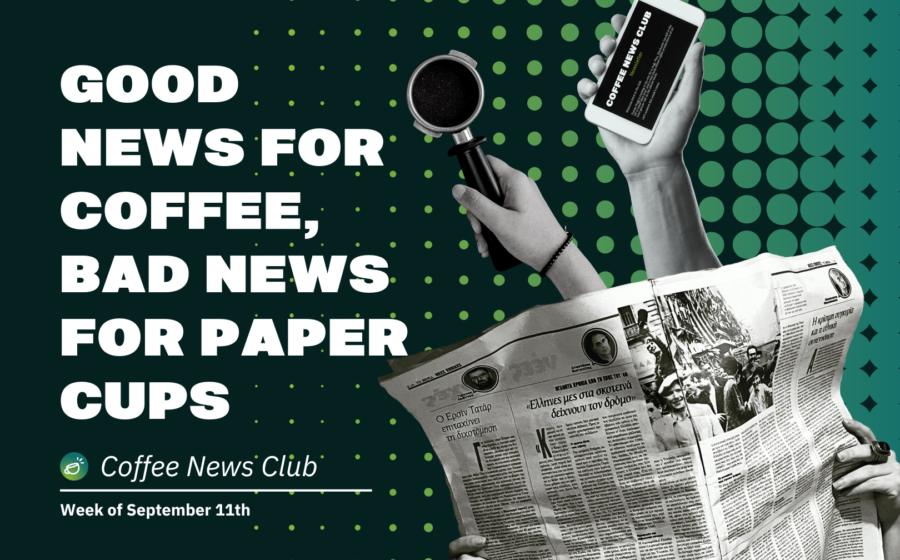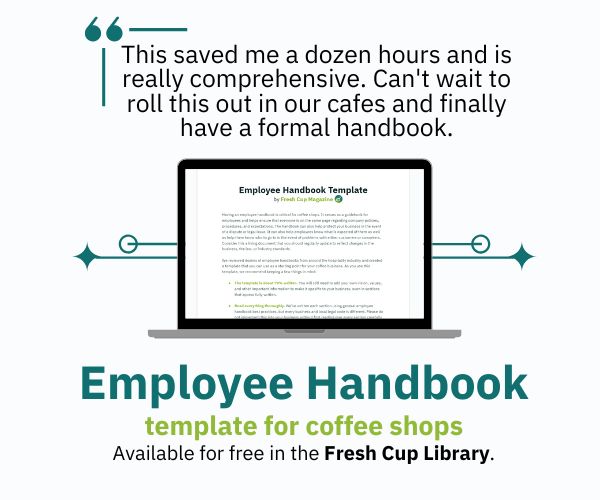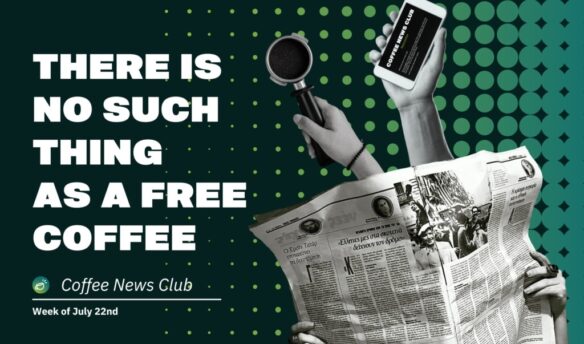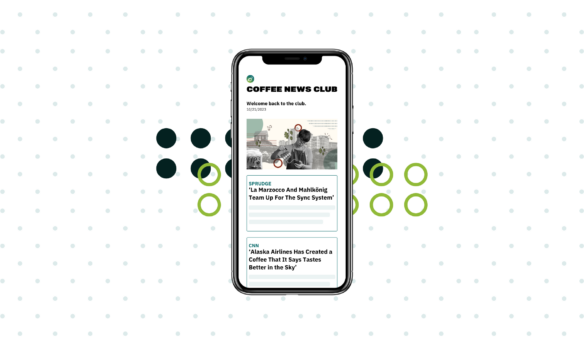Who ordered the liquor-laced latte? Plus, good news for sustainably-sourced coffee and bad news for paper cups.
‘GCP Snapshot: 70% of Coffee From Eight Global Buyers Meets Sustainability Baseline’ – via Daily Coffee News
The Global Coffee Platform (GCP) has released its annual report snapshot. The biggest finding? That more than 70% of the coffee purchased by eight of the world’s largest green coffee buyers was in line with GCP-recognized sustainability standards.
Last year, only 55% of coffees met GCP’s sustainability standards—this year’s 70% figure represents the highest percentage since GCP began publishing its snapshot reports in 2018.
To be labeled sustainable under GCP’s standards, a coffee must be verified by a third-party certification body like Rainforest Alliance or Fairtrade or fall under in-house, company-specific standards such as NKG Bloom or Nespresso AAA.
The companies involved in GCP’s assessment were JDE Peet’s, Julius Meinl, Keurig Dr Pepper, Melitta Group, Nestlé, SUPRACAFÉ, Tesco and Westrock Coffee Company. Together, these eight companies purchased 36 million 60-kilo bags of green coffee, of which 26 million met some baseline sustainability standard. Of course, that leaves 10 million bags that did not meet GCP’s standards.
In an announcement promoting the report, GCP Executive Director Annette Pensel said that while the uptick showed “the sector how increases of sustainable coffee purchases are expanding the global marketplace for sustainable coffees,” the industry’s most prominent companies needed to offer more pre-competitive collaboration and investment.
“To achieve transformational change that results in economic viability of sustainable coffee farming and a living income for producers and workers while preserving nature and addressing climate change effectively, we need more collective action and collective investments today,” Pensel said.
‘Liquor-laced Latte Brews up a Hit With Chinese Coffee Lovers’ – via France 24
Many news outlets reported on this story this week—we guess it’s hard to beat a headline containing the phrase “liquor-laced latte.”
Luckin Coffee has collaborated with the distiller Kweichow Moutai to produce a limited-edition alcoholic latte featuring the country’s national liquor, baijiu. The liquor, described by France 24 as “throat-scorching” and by other news stories as “fiery,” is more than 50% alcohol and can cost up to $345 per bottle—Luckin says its baijiu latte will have a much lower alcohol content and cost around $5.
Kweichow Moutai has recently been trying to court a younger audience. Last year, the distiller opened an ice cream store selling spiked sundaes, which proved to be a hit. It looks like their coffee collaboration has been well received—the Agence France-Presse news agency visited one Luckin cafe and noted that the bulk of the cafe’s orders had been for the baijiu latte, while other cafe locations had to stop taking orders because the drink was so popular.
Hashtags discussing the latte were also trending on Weibo, a social media platform popular in China, with many users wondering how safe the beverage was. “Can we drive a car after drinking that Moutai coffee?” has received over 430 million views, according to CNN. Luckin “suggests” that drivers, teenagers, and pregnant people should “refrain from drinking the latte.”
‘German Coffee Association Launches Grievance Tool for Coffee Supply Chains’ – via Daily Coffee News
As Germany’s corporate sustainability laws affect more coffee companies, the German Coffee Association has launched a new platform to collect and investigate anonymous reports of labor and environmental abuses within the coffee supply chain.
The tool helps companies comply with the German Supply Chain Due Diligence Act, which aims to improve human rights and improve environmental protection measures across global supply chains. This law, which came into effect in January 2023 and applies to businesses with 3,000 or more employees, “represents the first time that the responsibility of German companies to respect human rights in global supply chains has been given a legal foundation.” In January 2024, the threshold will drop to 1,000 workers and thus affect more coffee companies.
Designed and implemented in collaboration with the sustainability auditing firm Global Risk Assessment Services (GRAS), the tool, called Ear4U, will allow users to report nefarious behavior via an app, phone, or web-based mechanism. Users can report issues such as forced labor, civil liberty violations, or pollution, and the platform is available in German, English, Spanish, Portuguese, Swahili and Vietnamese.
GRAS will investigate relevant reports, collect further information from the grievant and contact the accused company. Users are “guarantee[d] complete confidentiality and anonymity,” according to the Ear4U website, and “no personal data is requested or collected at any time.”
More News
‘Fairtrade and B Lab Launch ‘Due Diligence’ Guide for Small and Micro Businesses’ – via Daily Coffee News
‘Honduras Coffee Exports Jump 37% yr/yr in August’ – via Nasdaq
‘Blanca Castro Named Executive Director of International Women’s Coffee Alliance (IWCA)‘ – via Daily Coffee News
‘Spend A Few Months In Rotterdam Working At “The World’s First Coffee Hotel”‘ – via Sprudge
‘Panamanian Geisha Wins Record High Price of $10,005 per Kilogram‘ – via STiR Coffee and Tea
‘SCA Names Board and Presidential Candidates for 2023 Election‘ – via Daily Coffee News
‘Death Wish Coffee Is Suing Death Before Decaf Coffee‘ – via Sprudge
‘At 30, Brazilian Coffee Coop Expocacer Rebrands, Expands Specialty Focus’ – via Daily Coffee News
The Week in Coffee Unionizing
- The National Labor Relations Board won a lawsuit with significant implications for unionizing businesses. The Guardian reports that “companies that are found to have committed illegal acts during unionization-election efforts will be forced to immediately bargain with the union rather than just have to run the election again.” Before the ruling, companies could hire “union-avoidance” firms to deter workers from voting for the union. As Starbucks Workers United wrote on Twitter, “If Starbucks is found to commit [unfair labor practices] after a majority of workers voice their support for a union, Starbucks will HAVE to bargain with those workers!”
- Organizers have had a week of ups and downs in Philadelphia, where a sustained effort is underway to unionize the city’s coffee shops. Over the past two years, Local 80, part of the Workers United Philadelphia Joint Board, has won voluntary recognition at several roasters and cafes, including Elixr Coffee, Ultimo Coffee Roasters, ReAnimator Coffee Roasters, Good Karma Cafe—and now Vibrant Coffee. Meanwhile, a group of workers at Good Karma petitioned the NLRB to decertify their union with support from the National Right to Work Legal Defense Foundation. This is the same anti-union group supporting decertification campaigns at several Starbucks locations, although all efforts have been unsuccessful.
The Week in Corporate Coffeewashing
Nestlé Australia is working to cut water usage at its Gympie, Queensland Nescafé factory, investing AU$2 million to cut its water use by 20% annually.
“Making coffee uses a lot of water, so finding ways to reduce our water use is a priority,” said factory manager Steve Taljaard. “Our new treatment system captures and recycles the water used in the coffee making process, and that recycled water is then used in our site’s cooling towers.”
The factory previously took water from the local Gympie water supply. Gympie and the wider Queensland region had been in a lengthy drought until 2022 when prolonged rain caused flooding.
Nestlé received lots of positive press coverage of its investment. While it’s good that the company is recycling water, it’s also worth pointing out the multiple instances of Nestlé fighting to extract water from beneath communities, many drought-stricken or without clean drinking water, to bottle and sell for a profit.
Is Coffee Good For You?
Coffee is generally considered good for you. But the receptacle you’re drinking it from might not be.
You probably know that single-use coffee cups made from things like polystyrene (think foam cups) aren’t great for the environment, but a new study shows just how toxic paper cups can be if disposed of incorrectly.
The problem is that most paper cups have a plastic liner to stop the cup from collapsing into a soggy mess once you fill it with hot coffee. “There are chemicals leaching out of these materials,” says lead author Bethanie Carney Almroth from the University of Gothenburg in Sweden.
Carney Almroth and colleagues placed plastic-lined paper cups in temperate water or sediment, leaving them to leach for a few weeks. “The larvae were then kept in aquariums containing the water or sediment tainted by the paper and plastic cups,” Wired reports. “Regardless of the source of the contamination, the larvae grew less in the sediment, and exposure to the tainted water also hindered their development.”
The researchers couldn’t pinpoint which chemicals were doing damage because manufacturers keep the makeup of their cup linings secret. “Coffee cups are made of a complex mixture of synthetic materials and chemicals,” the Wired article says. “Manufacturers add processing aids, heat stabilizers, and other substances, many of which are known to be toxic.”
A logical solution would be to recycle these cups, but that’s easier said than done. Separating the lining from the paper is tricky—in the UK, for example, only a few recycling centers can take the cups, meaning only 4% of the country’s single-use paper cups are recycled.
Plastic leaching can happen way before the cups are thrown out—one study in 2019 found that thousands of microplastics and heavy metals leached from plastic-lined cups within 15 minutes of being filled. In 2022, another study estimated that you could ingest 90,000 microplastic particles each year simply by drinking a single cup of takeaway coffee each week.
Beyond the Headlines
‘Can Coffee or a Nap Make Up for Sleep Deprivation?’ by Kimberly Fenn
‘Why Does Starbucks Stall Union Negotiations? Because It Can.’ by Mark Kreidler















